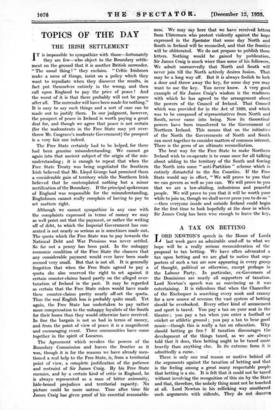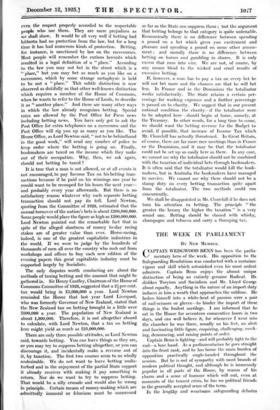A TAX ON BETTING
TORD NEWTON'S speech in the House of Lords last week gave an admirable send-off to what we hope will be a really serious reconsideration of the proposal to tax betting. We have often advocated a tax upon betting and we are glad to notice that sup- porters of such a tax are now appearing in every group of thought, political or otherwise, except perhaps in the Labour Party. In particular, ex-Governors of the Dominions are nearly all supporters of taxation. Lord Newton's speech was as convincing as it was entertaining. It is ridiculous that when the Chancellor of the Exchequer is searching every nook and cranny for a new source of revenue the vast system of betting should be overlooked. Every other kind of amusement and sport is taxed. You pay 'a tax on your seat in the theatre ; you pay a tax when you enter a football or cricket or athletic ground ; you pay a tax to hear good music—though this is really a tax on education. Why should betting go free ? If taxation discourages the development of the things taxed, as we are always told that it does, then betting ought to be taxed more heavily than anything else. In its extreme form it is admittedly a curse. --- There is only one real reason or motive behind all the arguments against the taxation of betting and that is the feeling among a great many respectable people that betting is a sin. It is felt that it could not be taxed without involving the recognition of this sin by the State and that, therefore, the unholy thing must not be touched at all. Lord Newton in his rollicking way smothered such arguments with ridicule. They do not deserve, even the respect properly accorded to the respectable people who use them. They are mere prejudices as we shall show. It would be all very well if betting had hitherto had no protection from the law, but for a long time it has had numerous kinds of protection. Betting, for instance, is sanctioned by law on the racecourses. Most people will. remember the curious lawsuits which resulted in a legal definition of a " place." According to the law you may not bet in the street which is a place," but you may bet as much as you like on a racecourse, which by some strange metaphysic is held to be not a " place." This subtle distinction is now observed as dutifully as that other well-known distinction which requires a member of the House of Commons, when he wants to refer to the House of Lords, to describe it as " another place." And there are many other ways in which the law already recognizes betting. Special rates are allowed by the Post Office for Press news including betting news. You have only got to ask the Post Office for extra telephones on a racecourse and the Post Office will rig you up as many as you like. The Home Office, as Lord Newton said, " not to be behindhand in the good work," will send any number of police to keep order where the betting is going on. Finally, bookmakers are taxed on the income which they make Out of their occupation. Why, then, we ask again, should not betting be taxed ?
It is true that a man is not allowed, or at all events is not encouraged, to pay Income Tax on his betting tran- sactions because if he paid on his winnings one year he would. want to be recouped for his losses the next year— and probably every year afterwards. But there is no satisfactory reason whatever why each separate betting transaction should not pay its toll. Lord Newton, quoting from the Committee of 1928, estimated that the annual turnover of the nation's bets is about £200,000,000. Some people would place the figure as high as £500,000,000. Lord Newton pointed out the remarkable fact that in spite of the alleged shortness of money to-day racing stakes are of greater value than ever. Horse-racing, indeed, is one of the greatest capitalistic industries in the world. If we were to judge by the hundreds of thousands of men all over the country who rush out from workshops and offices to buy each new edition of the evening papers this great capitalistic industry must be supported largely by Socialists.
The only disputes worth conducting are about the methods of taxing betting and the amount that might be gathered in. Sir Henry Cautley, Chairman of the House of Commons Committee of 1928, suggested that a 2/ per cent. tax would bring in £5,000,000 a year. Lord Newton reminded the House that last year Lord Liverpool, who was formerly Governor of New Zealand, stated that the New Zealand tax on betting brought in a little over £600,000 a year. The population of New Zealand is about 1,800,000. Therefore, it is not altogether absurd to calculate, with Lord Newton, that a tax on betting here might yield as much as £25,000,000.
There are only three possible attitudes, as Lord Newton said, towards betting. You can leave things as they are, or you may try to suppress betting altogether, or you can discourage it, and incidentally make a revenue out of it, by taxation. The first two courses seem to us wholly undesirable. We do not want to leave betting undis- turbed and in the enjoyment of the partial State support it already receives with making it pay something in return. Nor do we want to try to suppress betting. That would be a silly crusade and would also be wrong in principle. Certain means of money-making which are :admittedly immoral or felonious must be suppressed so far as the State can suppress them ; but the argument that betting belongs to that category is quite untenable. Economically there is no difference between spending a pound on a bet which gives you excitement and pleasure and spending a pound on some other amuse- ment ; and morally there is no difference between betting on horses and gambling in shares. It is only excess that runs into vice. We are not, of course, by any means blind to the wicked and cruel results of excessive betting.
If, however, a man has to pay a tax on every bet he will not bet more and the chances are that he will bet less. In France and in the Dominions the totalisator works satisfactorily., The State retains a certain per- centage for working expenses and a further percentage is passed on to charity. We suggest that in our present national condition the charity—if the totalisator were to be adopted here—should begin at home, namely, at the Treasury. In other words, for a long time to come, we should want the betting revenue for the Budget to avoid, if possible, that increase of Income Tax which Mr. Churchill has actually threatened. In Great Britain, of course, there are far more race meetings than in France or the Dominions, and it may be that the totalisator could not be set up so easily here as there. In any case, we cannot see why the totalisator should not be combined with the taxation of individual bets through bookmakers. It is often said that the totalisator would kill the book- makers, but in Australia the bookmakers have managed to survive.• We cannot see why there should not be a stamp duty on every betting transaction quite apart from the totalisator. The two methods could run concurrently.
We shall be disappointed in Mr. Churchill if he does not turn his attention to betting. The principle " the greater the luxury the higher the taxation " is a very sound one. Betting should be classed with whisky, champagne and tobacco and carry a thumping tax.























































 Previous page
Previous page